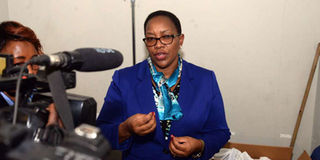Health ministry denies shortage of newborns' ARVs

Health Cabinet Secretary Sicily Kariuki speaks to journalists during an inspection of Ebola detection facilities at the Jomo Kenyatta International Airport in Nairobi on June 17, 2019. PHOTO | SALATON NJAU | NATION MEDIA GROUP
What you need to know:
- Health Cabinet Secretary Sicily Kariuki issued a statement on Friday, a day after news that the country was facing a shortage of Nevirapine and Zidovudine
- Ms Kariuki further noted that stock replenishment was taking place across the country to ensure uninterrupted supply of ARVs for Prevention of Mother to Child Transmission (PMTCT) of HIV.
- Medical personnel at several public hospitals, who spoke on condition of anonymity, said the shortage began about four months ago. They said it had been felt in several counties, with Nairobi, Mombasa and Uasin Gishu being most affected.
- The ministry says, however, that 69,000 bottles of Nevirapine and 38,000 bottles of Zidovudine are available in public facilities.
Kenya has an adequate supply of two syrups used to prevent HIV infections in newborns, the Health ministry has said, noting the stock will last until December 2019.
Cabinet Secretary Sicily Kariuki issued a statement on Friday, a day after news that the country was facing a shortage of Nevirapine and Zidovudine.
The two drugs are given as prophylaxis in syrup form to newborns to prevent them from contracting the HIV virus from their mothers during breastfeeding.
The antiretroviral (ARV) drugs also reduce the amount of the virus in their bodies.
Without them, about 69,500 children are exposed to the risk of infection.
REPLENISHMENT
Ms Kariuki further noted that stock replenishment was taking place across the country to ensure uninterrupted supply of ARVs for Prevention of Mother to Child Transmission (PMTCT) of HIV.
"Our attention has been drawn to concern over sustainability of ARV medicine stocks for [PMTCT] in public health facilities," she said in a statement to newsrooms.
On Thursday, an investigation by the Nation revealed that the two drugs were scarce.
Medical personnel at several public hospitals, who spoke on condition of anonymity, said the shortage began about four months ago. They said it had been felt in several counties, with Nairobi, Mombasa and Uasin Gishu being most affected.
The situation was dire, the sources said, noting the consequences of lack of intervention.
The administration of ARVs to newborns without HIV is meant to reduce the risk of mother-to-child transmission (perinatal acquisition).
The medicines have been missing in a number of public health facilities across the country, causing concern among health workers that infected mothers would be unable to prevent their children from getting the virus.
WHAT'S LEFT
The ministry says, however, that 69,000 bottles of Nevirapine are available in public facilities and that 196,000 bottles will be in the country in July.
"There are 38,000 bottles of Zidovudine, enough to last up to September. An additional batch of 80,000 bottles will arrive next month," CS Kariuki said.
According to the 2018 guidelines on using ARVs for treating and preventing HIV in Kenya, all HIV-exposed babies should receive infant ARV prophylaxis, consisting of six weeks of Zidovudine (AZT) and Nevirapine (NVP).
Continued doses of Nevirapine are to be administered until six weeks after complete termination of breastfeeding.
The Kenya HIV estimates report of 2018 notes that in 2017, approximately 69,500 HIV-positive pregnant women required PMTCT services countrywide.
These services are offered before conception, throughout pregnancy, during labour and while breastfeeding.
They include early infant diagnosis at four to six weeks after birth, testing at 18 months and/or when breastfeeding ends, and initiation to ARVs as soon as possible for HIV-exposed infants to prevent infection.





